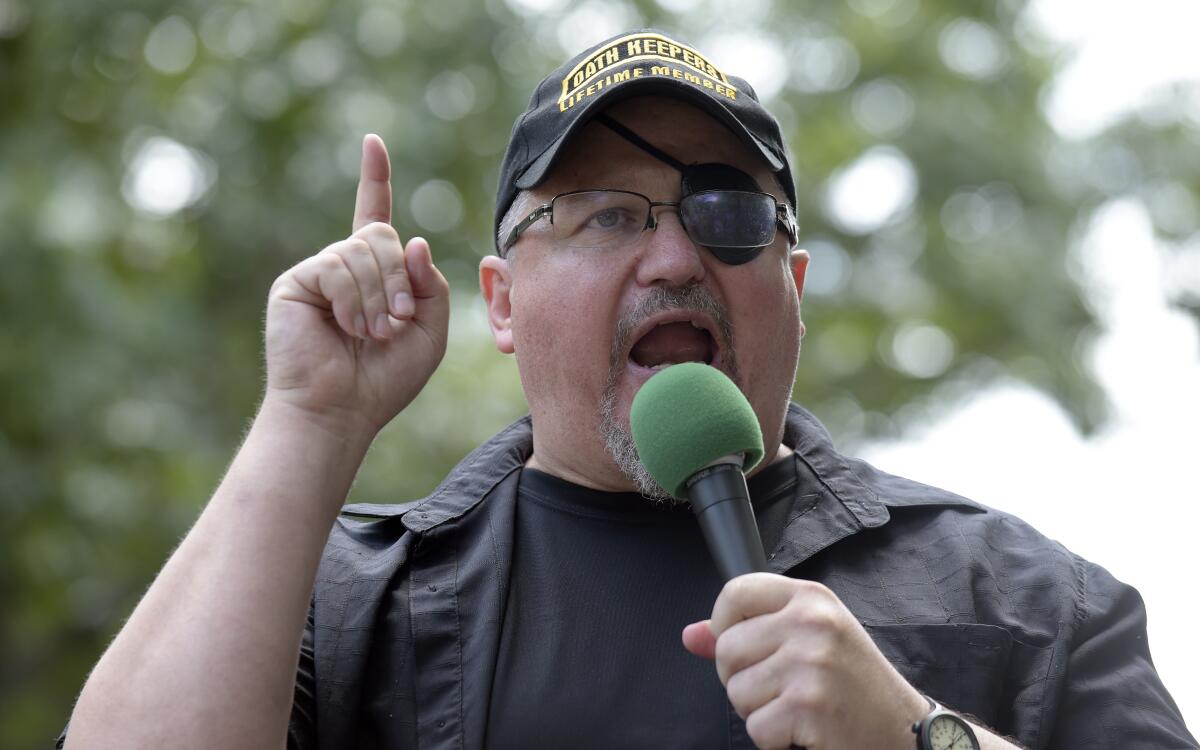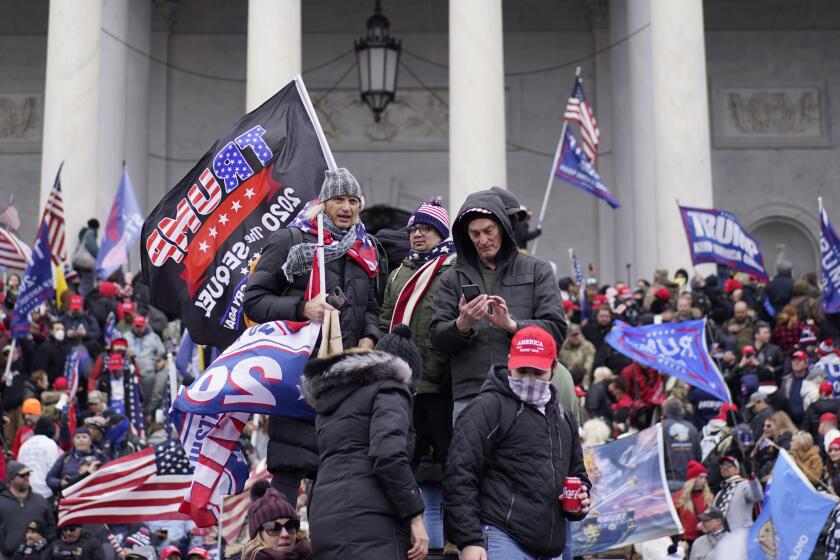Oath Keepers founder Stewart Rhodes convicted of seditious conspiracy in Jan. 6 case

- Share via
WASHINGTON — Oath Keepers founder Stewart Rhodes was convicted Tuesday of seditious conspiracy for a violent plot to overturn President Biden’s election, handing the Justice Department a major victory in its massive prosecution of those involved in the Jan. 6, 2021, insurrection at the U.S. Capitol.
A Washington, D.C., jury found Rhodes guilty of sedition after three days of deliberations in the the nearly two-month trial that showcased the far-right extremist group’s efforts to keep then-President Trump in the White House at all costs. Rhodes was acquitted of two other conspiracy charges.
A co-defendant — Kelly Meggs, who led the anti-government group’s Florida chapter — was also convicted of seditious conspiracy, while three other associates were cleared of that charge. Jurors found all five defendants guilty of obstruction of an official proceeding: Congress’ certification of Biden’s electoral victory.
The verdict, while mixed, marks a significant milestone for the Justice Department and is likely to clear the path for prosecutors to move ahead at full steam in upcoming trials of other extremists accused of sedition.
Rhodes and Meggs are the first people in nearly three decades to be found guilty at trial of seditious conspiracy — a rarely used Civil War-era charge that can be difficult to prove. The offense calls for up to 20 years behind bars.
The convictions could embolden investigators, whose work has expanded beyond those who attacked the Capitol to focus on others linked to efforts to overturn the 2020 election. U.S. Atty. Gen. Merrick Garland recently named a veteran prosecutor, Jack Smith, to serve as special counsel to oversee key aspects of the federal investigation into efforts to subvert the election as well as a separate investigation into the retention of classified documents at Trump’s Florida estate, Mar-a-Lago.
Garland said after the verdict that the Justice Department “is committed to holding accountable those criminally responsible for the assault on our democracy” on Jan. 6.
“Democracy depends on the peaceful transfer of power. By attempting to block the certification of the 2020 presidential election results, the defendants flouted and trampled the rule of law,” Steven M. D’Antuono, assistant director in charge of the FBI’s Washington Field Office, said in an emailed statement. “This case shows that force and violence are no match for our country’s justice system.”
Using dozens of encrypted messages as well as recordings and surveillance video, prosecutors made the case that Rhodes began shortly after the 2020 election to prepare an armed rebellion to stop the transfer of presidential power.
Over seven weeks of testimony, jurors heard how Rhodes rallied his followers to fight to defend Trump, discussed the prospect of a “bloody” civil war and warned that the Oath Keepers may have to “rise up in insurrection” to defeat Biden if Trump didn’t act.
The Justice Department can bring in extra prosecutors, and public defenders can be brought on to help with defense. But there is a finite amount of time and a finite number of judges.
Defense attorneys accused prosecutors of twisting their clients’ words and insisted the Oath Keepers came to Washington only to provide security for figures such as Roger Stone, a longtime Trump ally. The defense focused heavily on seeking to show that Rhodes’ rhetoric was just bluster and that the Oath Keepers had no plan before Jan. 6 to attack the Capitol.
Rhodes intends to appeal, defense attorney James Lee Bright told reporters. Another lawyer for Rhodes, Ed Tarpley, described the verdict as a “mixed bag,” adding, “This is not a total victory for the government in any way, shape or form.”
“We feel like we presented a case that showed through evidence and testimony that Mr. Rhodes did not commit the crime of seditious conspiracy,“ Tarpley said.
On trial alongside Rhodes, of Granbury, Texas, and Meggs were Kenneth Harrelson, another Florida Oath Keeper; Thomas Caldwell, a retired Navy intelligence officer from Virginia; and Jessica Watkins, who led an Ohio militia group.
Caldwell was convicted on two counts and acquitted on three others, including seditious conspiracy. His attorney, David Fischer, called the verdict a “major victory” for his client and a “major defeat” for the Justice Department. He also said he would appeal the two convictions.
Jury selection for a second group of Oath Keepers facing seditious conspiracy charges is scheduled to begin next week. Several members of the Proud Boys, including the former national Chairman Enrique Tarrio, are also scheduled to go to trial on the sedition charge in December.
In an extraordinary move, Rhodes took the stand to tell jurors there was no plan to attack the Capitol and to insist that his followers who went inside the building went rogue.
Rhodes testified that he had no idea his followers were going to join the mob and storm the Capitol, and said he was upset after he found out some did. Rhodes said they were acting “stupid” and outside their mission for the day.
Prosecutors said the Oath Keepers saw an opportunity to advance their plot to stop the transfer of power, and sprang into action when the mob started storming the Capitol. The Capitol attack was a “means to an end” for the Oath Keepers, Assistant U.S. Atty. Kathryn Rakoczy told jurors in her closing argument.
The evidence in the Capitol insurrection probe rivals what the Hubble telescope has amassed. Sorting through it all has ground many cases to a halt.
Jurors heard how Rhodes had spent thousands of dollars on an AR-platform rifle, ammunition magazines, mounts, sights and other equipment on his way to Washington ahead of the attack. They watched surveillance footage from the Virginia hotel where some Oath Keepers stashed weapons for “quick reaction force” teams that prosecutors said were prepared to get weapons into the city quickly if they were needed. The weapons were never deployed.
On Jan. 6, Oath Keepers wearing combat gear were seen on camera shouldering their way through the crowd and into the Capitol. Rhodes remained outside like a “general surveying his troops on the battlefield,” a prosecutor said. After the riot, Rhodes and other Oath Keepers went to an Olive Garden restaurant to celebrate, according to prosecutors.
The trial revealed new details about Rhodes’ efforts to pressure Trump to fight to stay in the White House in the weeks leading up to Jan. 6. Shortly after the election, in a group chat with Stone and others, called “FOS” or “Friends of Stone,” Rhodes wrote: “So will you step up and push Trump to FINALLY take decisive action?”
Another man testified that after the riot, Rhodes tried to persuade him to pass along a message to Trump that urged the president not to give up his fight to hold onto power. The intermediary — a man who told jurors he had an indirect way to reach the president — recorded his meeting with Rhodes and went to the FBI instead of giving the message to Trump.
“If he’s not going to do the right thing and he’s just gonna let himself be removed illegally, then we should have brought rifles,” Rhodes said during that meeting, according to a recording played for jurors.
“We should have fixed it right then and there. I’d hang [expletive] Pelosi from the lamppost,” Rhodes added, referring to Democratic House Speaker Nancy Pelosi.
Three other Oath Keepers previously pleaded guilty to seditious conspiracy. The last time the Justice Department had secured such a conviction at trial was in the 1995 prosecution of Islamic militants who plotted to bomb New York City landmarks.
Richer reported from Boston. Associated Press journalists Nathan Ellgren and Andrew Harnik contributed to this report.
More to Read
Sign up for Essential California
The most important California stories and recommendations in your inbox every morning.
You may occasionally receive promotional content from the Los Angeles Times.















